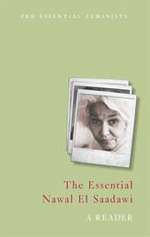
If I wrote for myself alone, I would choke on my words.
—From the short story "Death of an Ex-minister"
Nawal el Saadawi is a feminist, novelist, poet, playwright, political activist, doctor, teacher, mother, daughter. She has a formidable intellect, is courageous, forthright and controversial.
This reader brings together el Saadawi's writing from the past thirty years in its various forms, from essays to poems to plays. She ranges from overtly political discourse to memories of her childhood to her first trip outside of Egypt.
Whatever her immediate topic, the oppression of women is her constant theme. El Saadawi is probably best known for her campaign against female genital mutilation and her vociferous opposition to the veil. Her writing about Islam and Egyptian society has put her life in danger. El Saadawi has been imprisoned; her name has appeared on a fundamentalist death list, forcing her to flee; and she has been in court several times, charged with insulting God and the prophets.
However, her condemnation of religious fundamentalism, of oppression and inequality, is not restricted to Islam or to the countries of North Africa and the Middle East. She is critical of religious extremism and patriarchy in all its forms, in all places; she considers the makeup of 'Western' women to be as much a tool of oppression as the veil and thinks women are mistaken when they see either as a way of claiming their independence. El Saadawi's views are not unthinking reaction to the media portrayal of Islam—she points out that she has studied the Koran, the Bible and the Torah and she draws conclusions that cross religions.
Much of el Saadawi's writing is also a critique of capitalism and neo-colonialism, an analysis of the United States' 'interference' in North Africa and the Middle East apparently in the name of spreading democracy but really for the benefit of the markets. El Saadawi grew up at a time when the British had a heavy influence on Egyptian politics, and she is very aware of the devastating impact of colonialism on indigenous culture. For her this neo-colonialism is inextricably linked to women's status in the world. Poverty and a lack of social and cultural development ensure that women are continually subjected to economic and political repression, but it is essential that changes come from Arab women themselves. Copying American ways does not mean that women become free; several times el Saadawi mentions Egyptian girls who are veiled but whose midriff is showing as part of their westernised fashion. This is not liberation; this is women adopting other forms of oppression.
While seemingly less political than other aspects of her writing, motherhood is an important issue for el Saadawi. I think she wants to reclaim the importance of motherhood from a patriarchal world and she returns again and again to her relationship with her mother, with her aunts and with her own daughter. Having said that, this is no misty-eyed vision of the sanctity of motherhood. El Saadawi points out that mothers play a role in perpetuating patriarchal oppression. She knows of what she speaks—her own mother subjected El Saadawi to genital mutilation.
This review only covers a little of what is contained in this collection of writing. Whether fiction or non-fiction, el Saadawi's
writing is alive with a passion that has not diminished over more than thirty years. Please, go and explore it for yourself.

Zed Books, paperback, 9781848133358
